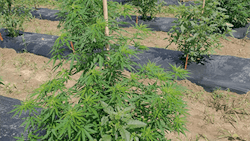
National lawmakers have become the latest to criticize the U.S. Drug Enforcement Agency’s (DEA’s) latest proposed regulations on hemp.
U.S. Sens. Ron Wyden and Jeff Merkley, both of whom wrote the provision in the 2018 Farm Bill to legalize hemp, recently sent a letter to the DEA expressing “strong objections” to its “unilateral and uncalled for” interim final rule (IFR) on hemp.
“In effect, the IFR criminalizes the intermediate steps of hemp processing, which is wholly inconsistent with Congress’s clearly stated purpose and the text of the 2018 Farm Bill,” the senators wrote. “In our view, the IFR rewrites the 2018 Farm Bill contrary to Congressional intent.”
The DEA’s IFR on hemp has caused an uproar among industry members, as many have interpreted it as an attempt to regulate products derived from lawful hemp—specifically, intermediary and waste hemp material. Those products often experience temporary spikes in tetrahydrocannabinol (THC) content above the legal 0.3% limit, but they are either amended before reaching the final product or not used at all.
In its IFR, the DEA expresses its authority to regulate any cannabis material above the 0.3% THC limit, leading many to believe the agency is attempting to criminalize hemp processing.
The IFR has sparked two lawsuits against the DEA from the Hemp Industries Association and RE Botanicals—one in the U.S. Court of Appeals for the District of Columbia Circuit, and another in the U.S. District Court for the District of Columbia. The IFR also garnered more than 3,300 comments before the public comment period closed Oct. 20, many of which expressed opposition to the proposed regulations.
In their letter, Wyden and Merkley assert their intention when crafting the Hemp Farming Act of 2018, which was eventually included in the 2018 Farm Bill, was to remove the DEA’s authority over regulating hemp production.
“The [DEA] IFR purports to merely implement the 2018 Farm Bill when, in fact, it does significantly more. The IFR treats hemp as a Schedule I controlled substance at any point its THC content exceeds 0.3% THC. However, when Congress passed the 2018 Farm Bill, we understood that intermediate stages of hemp processing can cause hemp extracts to temporarily exceed 0.3% THC, which is why we defined hemp based on its delta-9 THC level,” Wyden and Merkley write in their letter. “Further, we defined hemp’s THC content on a dry weight basis because dry weight measurements are commonly taken from the initial hemp plant and final hemp-derived product.”
Despite widespread opposition to its IFR, the DEA has maintained its position to regulate hemp in a recent statement to Hemp Grower.
“The Farm Bill did not relieve the DEA of its obligation to enforce the CSA and products still controlled. Our engagement with the USDA is necessary as it relates to those circumstances," DEA spokesman Michael D. Miller told Hemp Grower Editor Stephen Langel.
Meanwhile, some members of the hemp industry say they hope opposition from Congress members will help the DEA change its position.
"We are grateful for Senator Wyden and Merkley’s leadership and are hopeful that the DEA will listen and take necessary steps to withdraw its misguided rule,” says Jonathan Miller, general counsel for the U.S. Hemp Roundtable. “We will continue to pursue our efforts to fix this problem in Congress and/or the courts.























